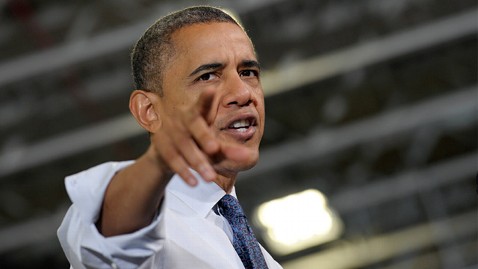
President Barack Obama gestures as he speaks at the Rodon Group, which manufactures over 95% of the parts for K' NEX Brands toys, Nov. 30, 2012, in Hatfield, Pa. (Susan Walsh/AP Photo)
HATFIELD, Pa. — President Obama today accused Republicans of putting Americans at risk of a “Scrooge Christmas” if they fail to extend middle class tax cuts, telling workers in Pennsylvania that a tax increase would be like a “lump of coal.”
“This is not some run-of-the-mill debate. This isn’t about which political party can come out on top in negotiations. We’ve got important decisions to make that are going to have a real impact on businesses and families all across the country,” the president said.
Obama made his remarks about the negotiations to avert the impending “fiscal cliff” as he stood before piles of toys at the Rodon Group factory, which manufactures Lincoln Logs, K’Nex and Angry Bird toys.
“I’ve been keeping my own naughty and nice lists for Washington. So you should keep your eye on who gets K’NEX this year,” he quipped. “There are going to be some members of Congress who get them, and some who don’t.” One day after the fiscal cliff talks between the White House and House Republicans took a turn for the worse, the president admitted there are going to be “some prolonged negotiations” to get the deficit under control because “you know, in Washington, nothing’s easy.”
“We’ve got some disagreements about the high-end tax cuts, right?” he said of his insistence on raising taxes on the top 2 percent as part of a broader deficit reduction deal. “That’s a disagreement that we’re going to have and we’ve got to sort out. But we already all agree, we say, on making sure middle-class taxes don’t go up. So let’s get that done. Let’s go ahead and take the fear out for the vast majority of American families so that they don’t have to worry about $2,000 coming out of their pockets starting next year.”
For a Different Take on Politics Try OTUSnews.com
Shortly after the president spoke, House Speaker John Boehner told reporters on Capitol Hill, “There’s a stalemate. Let’s not kid ourselves. I’m not trying to make this more difficult. If you’ve watched me over the last three weeks, I’ve been very guarded in what I had to say, because I don’t want to make it harder for me or the president or members of both parties to be able to find common ground.”
As Americans head out to shop for the holidays, the White House has warned consumer spending would take a hit of $200 billion in 2013, or roughly 1.4 percent of the GDP, if Congress could not reach a budget deal by the end of the year. As he did earlier this week, the president enlisted the help of Americans to pressure lawmakers to act on middle class tax cuts and said he’s ready to do his part. “If we can just get a few House Republicans on board, we can pass the bill in the House, it will land on my desk, and I am ready. I’ve got a bunch of pens ready to sign this bill… There are no shortage of pens in the White House,” he joked.
On Thursday, the White House put forth a proposal of $1.6 trillion in tax increases over the next 10 years, $50 billion in new stimulus spending, $400 billion in unspecified Medicare cuts, and a measure to effectively end Congress’s ability to vote on the debt limit. The offer, which closely mirrors the president’s previous deficit-reduction plans, lacked concessions to Republicans including detailed spending cuts and was strongly rejected.
Get More Political Analysis from ABC’s The Note
Factories like the Rodon Group’s will see a tax increase if a deal is reached in Democrats’ favor. But K’Nex CEO Michael Araten told ABC News his third-generation company wouldn’t be forced to change practices and had planned several years in advance to compensate for any tax increase.
“If on an individual basis we have some taxes we’ll deal with that,” he said. “But we don’t think that an incremental difference of 2 or 3 percent will meaningfully move our budgets in a way that impacts our hiring or investment plans. Everyone who has a job is going to have a job on Jan. 1 whether we go over the cliff or not.”
Striking into the Obama tour’s territory, today Majority Whip. Rep. Kevin McCarthy circulated a video of another Pennsylvania small business owner, Jerry Gorski of Gorski Engineering, explaining how the tax increase on the top 2 percent of income earners would harm his establishment.









